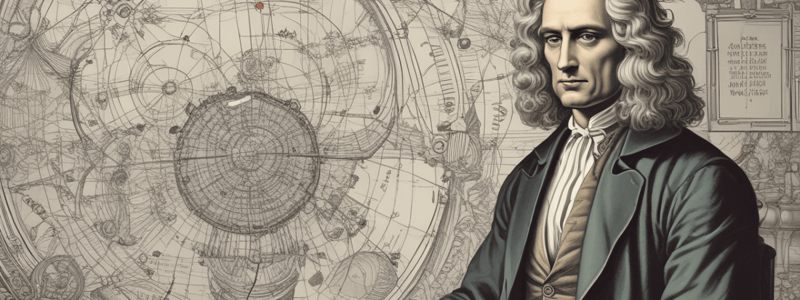Podcast
Questions and Answers
What was a major characteristic of the Scientific Revolution?
What was a major characteristic of the Scientific Revolution?
Who is credited with proposing the idea that the Earth revolves around the Sun?
Who is credited with proposing the idea that the Earth revolves around the Sun?
What was Francis Bacon's major contribution to the Scientific Revolution?
What was Francis Bacon's major contribution to the Scientific Revolution?
What was the result of the Scientific Revolution on traditional society?
What was the result of the Scientific Revolution on traditional society?
Signup and view all the answers
When was the publication of On the Revolutions of the Heavenly Spheres by Nicolaus Copernicus?
When was the publication of On the Revolutions of the Heavenly Spheres by Nicolaus Copernicus?
Signup and view all the answers
What was the title of the book series published by Isaac Newton in 1687?
What was the title of the book series published by Isaac Newton in 1687?
Signup and view all the answers
Who is credited with advancing the heliocentric model of the universe?
Who is credited with advancing the heliocentric model of the universe?
Signup and view all the answers
What was the significant impact of the Scientific Revolution on society?
What was the significant impact of the Scientific Revolution on society?
Signup and view all the answers
What was the significance of the laws of motion proposed by Isaac Newton?
What was the significance of the laws of motion proposed by Isaac Newton?
Signup and view all the answers
What was the ultimate impact of the Scientific Revolution on the way people thought about truth and knowledge?
What was the ultimate impact of the Scientific Revolution on the way people thought about truth and knowledge?
Signup and view all the answers
Study Notes
The Scientific Revolution
- The Scientific Revolution was a period of dramatic change in Europe between the 16th and 18th centuries that transformed the understanding of society and nature through a new, scientific logic.
- The revolution introduced the scientific method, a system where truth is achieved by questioning assumptions and analyzing data from repeatable experiments.
Major Events
- The publication of "On the Revolutions of the Heavenly Spheres" by Nicolaus Copernicus in 1543 sparked the new wave of scientific thinking, proposing that the Earth revolves around the Sun, challenging the traditional geocentric model.
- Francis Bacon's work in the early 17th century outlined the process of designing and carrying out experiments as the foundation of science.
- In 1620, Bacon proposed the scientific method, where all things should be tested through carefully planned experiments.
- Isaac Newton's publication of "Principia" in 1687 established the new scientific mindset, using the scientific method to challenge traditional assumptions about physics, math, and nature.
Breakthroughs
- The heliocentric model of the universe was advanced by Copernicus and later built upon by scientists like Johannes Kepler and Galileo, challenging the traditional geocentric model.
- Isaac Newton proposed the theory of gravity, demonstrating its existence and suggesting it was the force responsible for the movement of planets.
- Newton developed the laws of motion, defining the relationship between an object and the forces that make it move.
Effects of the Scientific Revolution
- The Scientific Revolution led to the development of industrial machines, introducing society to a wider range of uses for machines and changing the social mindset about machines.
- The Industrial Revolution, the transition to industrial society, began in the mid-18th century, reflecting the impact of the Scientific Revolution on society.
- The Scientific Revolution shifted the way people thought, from traditional assumptions to science, supported by non-biased experiments, as the fountain of all knowledge.
Studying That Suits You
Use AI to generate personalized quizzes and flashcards to suit your learning preferences.
Description
This quiz explores the impact of Isaac Newton's book, Principia, on the Scientific Revolution and the development of modern science. It covers Newton's contributions to physics, math, and our understanding of nature.





